How To Stop Being A Bar Owner
By Kendra Anderson, owner of the now-closed Bar Helix, Denver

Hi. My name is Kendra. And I’m a recovering bar owner.
It’s been more than 60 unintentional days since our last service at Cabana X @ Bar Helix, the unplanned restaurant I created in response to an unexpected global pandemic. Every one of those 60 days has been unimaginably challenging because I have been forced to navigate the process of reorienting my entire world, which just 60-some days ago, revolved 99 percent around being a bar owner.
I don’t mean challenging in an I can’t get out of bed or take a shower kind of way. Most of the time, it’s more like when people ask me what I do for a living, do I refer to myself as a bar owner, or a former bar owner? One day it was what am I going to do with all of these barspoons? challenging. This week it was an all I want to do is talk to people about Negronis but there’s no one to talk to challenge.
As you might imagine, there are a plethora of tools that will help you figure out how to open a bar. When I was working on the business plan for Bar Helix in 2012, a quick Google search netted dozens of results: article after article chock-full of the specific steps required. But when I tried to find resources to help me navigate taking apart the elaborate infrastructure I spent more than three years working my ass off to hold together, there was almost no helpful guidance to be found.
And that’s just in reference to the business side of things.
How to stop being a bar owner involves much more than just trying to help everyone on your team find a new job or cancelling deliveries from each of the vendors you’ve grown accustomed to seeing every week.
Figuring out how to stop being a bar owner emotionally has been one of the toughest things I’ve ever had to do.
I’ve spent a lot of time answering questions like, “Who am I without Bar Helix…with no guests to serve? With no staff to lead?” “What do I do with all the new cocktail ideas I have?” or “This song would be perfect for a Bar Helix playlist; should I still save it?”
“Do I keep or throw away the 250 business cards delivered two days before my landlord threw down an untenable ultimatum?” “Am I still OK to hang out with my restaurant owner friends when I no longer share their same daily worries or joys?” “Do I still bother to read articles about a new whiskey distillery if I’m not sure if or when I’ll have a venue in which to serve it?” Without exaggeration, these sorts of questions fill my days. Not having my bar to run feels like having a phantom limb.
A MONTH OR SO AGO I HEARD THE PHRASE, “GRIEF IS LOVE WITH NOWHERE TO GO.”
Then there has been the often painful re-entry into what I semi-jokingly refer to as “normal” life, which is the life I imagine people who don’t work 80-hour weeks in the hospitality industry live. Being a bar owner meant that I hadn’t spent more than a handful of hours asleep per week in my home in over three years. Now, I’ve realized that I never got around to changing lightbulbs that burned out two years ago. My closets are in desperate need of purging. I found a bag of shoes meant to be taken for repair a year ago. There was a pantry full of expired canned goods (did you know canned goods expire?).
And as if all of this wasn’t enough, figuring out how to stop being a bar owner has involved so much crying. I find it happening unexpectedly in front of many different people, including near strangers. I burst into tears while standing in the shower, sob underneath my sweaty paper mask in hot yoga, praying no one thinks I have COVID. Some of these crying jags turn into dizzy spells that legit remind me of the time I had vertigo in college, when I couldn’t move without feeling like I had to throw up.
What do I say when people ask me what’s next…when all I want to do is be back at my bar?
How do I express my gratitude for everyone who reached out to me with gestures of incredible kindness…when every time I start writing a thank-you note, I break down?
What’s the appropriate response to being offered an incredible job working with people I respect…when every fiber of my being says that I was born to be an entrepreneur, running my own business?
The short answer to all of these questions is this: I have zero fucking clue but I’m trying to figure it out.
Right now, not being a bar owner looks like this:
- Reading again—things with pages, not just POS reports or invoices.
- Filling my formerly always-empty refrigerator with more groceries than I can possibly eat and cooking—just for myself.
- Trying to make up for months upon months of very little sleep (this is really hard).
- Taking long walks. Soooo many walks.
- Making a playlist and sharing it with a dear friend instead of my guests.
- Leaning in and asking for help from the remarkable circle of friends and family who love me.
A month or so ago I heard the phrase, “Grief is love with nowhere to go.” So, for now, I’m going to keep working hard to find as many places as I can to send all of the love I had for Bar Helix. And—maybe—allowing myself to dream of opening a new bar that I can love as wholly and desperately as I did my first one.
Coming Home
By Sarah Jane Lubeley, co-owner of the Dogwood, Crested Butte
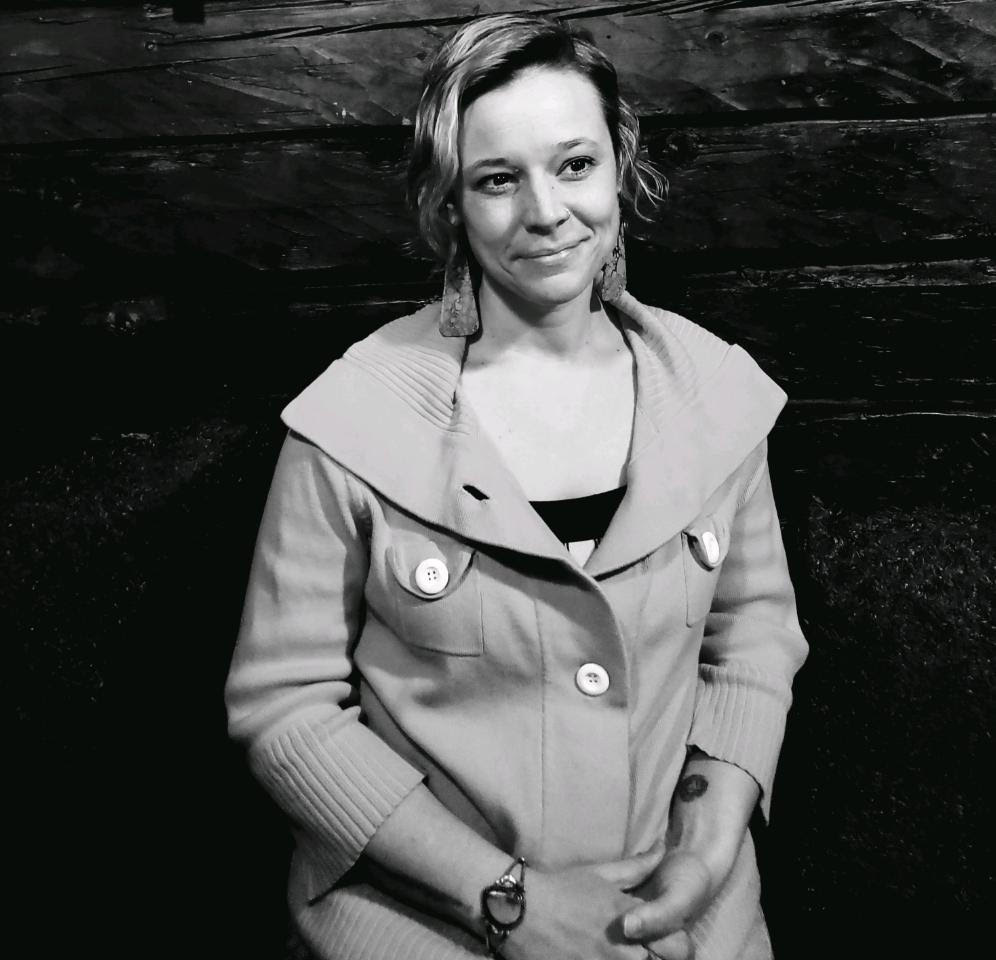
The culture that I love and try to foster at our bar is a space where friends can gather, people can create new friendships, and guests can be comfortable just sitting quietly. Bars are a place where people celebrate big moments and everyday moments, and we get to be a part of those occasions and those memories.
WE NEED THEIR SUPPORT THROUGH THESE CHANGING TIMES, AND THEY NEED US JUST AS MUCH.
Coming together to relax and imbibe at the end of a day of work or skiing is more important than ever for us as humans. There are many restaurants and bars being diligent about implementing safety protocols in order to keep the doors open and make guests feel safe and comfortable. Through this process, we have made deeper connections with many of our guests and consider so many of them friends now.
We need their support through these changing times, and they need us just as much. Many of us have felt lonely and disconnected; we are grateful that we can still provide a space for people to come, to feel like they can take a deep breath, relax, and enjoy themselves. Here, they know they will be taken care of.
In Flux
By Dusty O’Connell, former lead bartender at Joy Hill, Denver
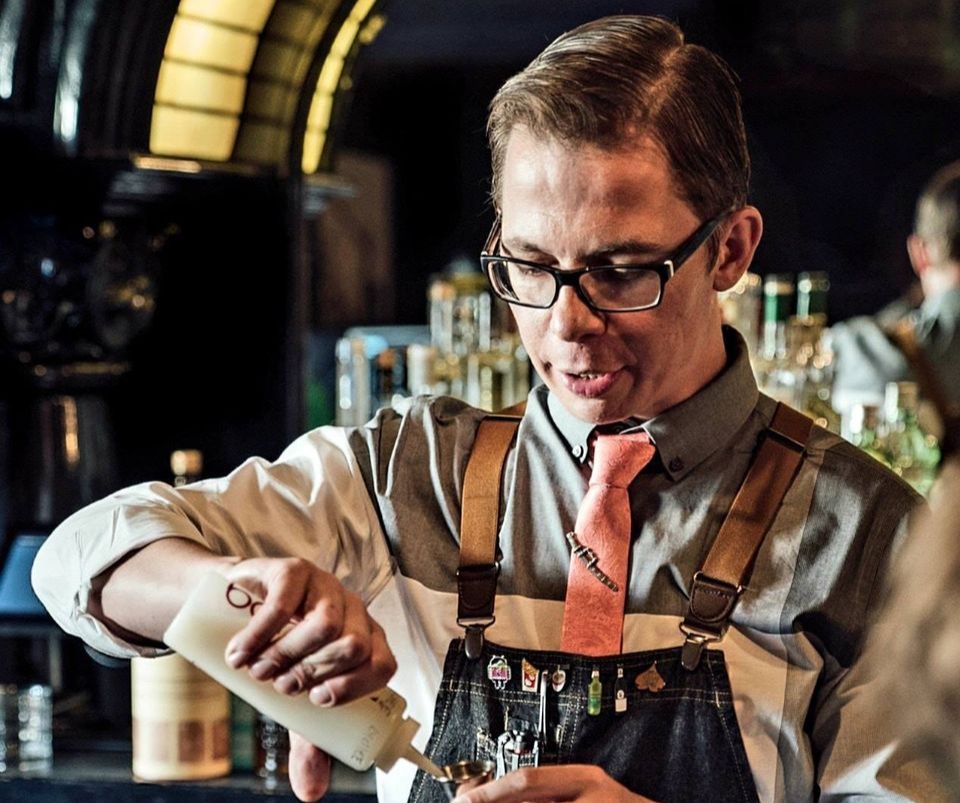
It took me a while to commit to hospitality as a career. My professional journey has been unconventional, born somewhat of luck and circumstance, and somehow it all comes back to the same things I felt when I was asked what I wanted to do with my life. I wanted to listen and share and teach. When you’re behind a bar, there are ample opportunities to do all three. I found my happy place discovering and sharing my passion for flavors, craft, and technique with guests and staff.
This year, the bar industry was practically hollowed out. The rhythm of a bustling bar, the conviviality of guests meeting for the first or the 100th time? Gone. Opportunities to entertain and surprise and delight one another were suddenly few and very far between. It seems foreign these days to sit shoulder-to-shoulder in public with strangers and friends. Many in the industry are struggling to survive. I hung up my apron, but with the promise to myself that it would not be for the last time.
I’ve learned over the last 15 years that it’s easy to be averse to drastic change. Once the wheels of a bar or restaurant are in motion, they’re difficult to stop. Even shifting direction can seem overwhelming. It’s incredibly rare to find opportunities to pause and reflect and make big changes that would benefit guests, staff, and operators.
“BACK TO NORMAL” IS OFF THE TABLE, BUT….PEOPLE WILL SIT NEXT TO FRIENDS AND STRANGERS AGAIN.“
Fortunately, we’re very good at adaptation. We have proven we’re fluid. Every great bar team has made magic happen in less-than-magical surroundings. Organizations started by folks in the industry (like Focus on Health and Culinary Hospitality Outreach and Wellness) give us new ideas about how to take care of ourselves. We are calling out hostile work environments and testing ways to adapt a tip culture that has long fostered inequity and resentment between departments. We have an exploding catalog of products to offer, from boutique spirits to zero-proof ingredients, all made with love by people who are passionate about their craft.
Some of us have become ambassadors, championing those products and the people who make them. As a team, we can offer both the familiar and the unexpected to our guests. We’ve experimented with packaging cocktails and spirits in a takeaway-friendly way. The last 20 years have seen beverage culture grow and change in a thousand ways. The pandemic has accelerated that process, and we have more resources than ever at our disposal to learn from and to share. We have the opportunity to make big changes today.
“Back to normal” is off the table, but the future is bright if we’re willing to engage it earnestly and with creativity. People will sit next to friends and strangers again. Surprise and delight will never go out of style. Our guests will still love tasting something special. They will still want to see a friendly face and bend a sympathetic ear. We can do those things again, and more. We can make our careers more rewarding and more sustainable. We can promote great products and be ambassadors for our community. We can welcome the future the same way we’d welcome our favorite regulars—with a smile and good cheer. I look forward to putting my apron back on, and to again do what we’ve always been here to do.
Last Call
By Jeremy Barbin, former bartender at La Cocina and current liquor rep, Aspen
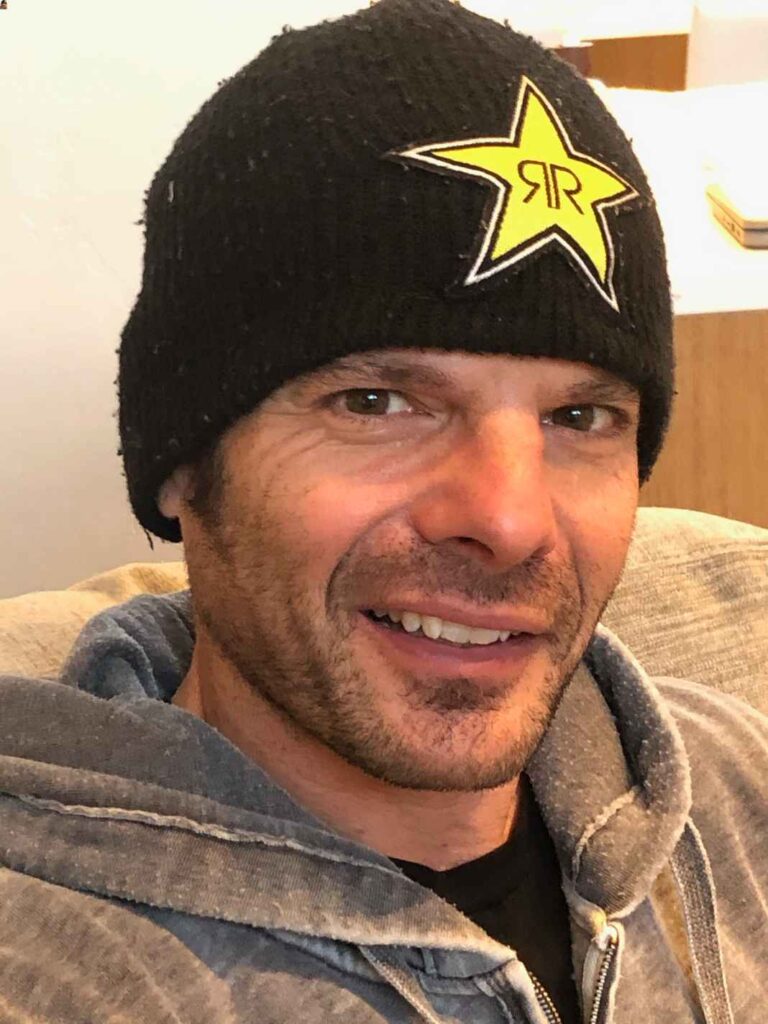
To you, he might look like a cowboy drinking a beer. To me, he is a broken soul drinking the same type of beer he always does on a Monday night, usually with his best friend by his side. But tonight he’s drinking alone after losing his friend to cancer three nights ago.
To you, they might look like a couple sharing a glass of Champagne. To me, they are role models of what love can be between two people who care deeply for each other as they toast 50 years together at the bar where they met.
To you, they might look like young adults sipping a cocktail. To me, it’s a friendship that started a week ago that has blossomed into a love story between two lonely people who have found the companionship they were searching for.
I HOPE YOU ARE MUDDLING THROUGH. I HOPE YOU HAVEN’T GIVEN YOUR LAST CALL.
To you, I might look like a bartender. To them, I am a friend, a listener, an entertainer, a shoulder to cry on, and a voice of reason. Making cocktails is the easy part.
As I look through the windows of my favorite bars and see the lonely stools, the blank faces behind the taps, my heart breaks. There are no cowboys grieving, no couples celebrating, nobody falling in love. What is more essential than that? To each of you who has spent his or her life being that voice of reason, that shoulder to cry on, I hope you are muddling through. I hope you haven’t given your last call.
I Can See Clearly
By Cecelia Jones, general manager at Uncle, West Washington Park, Denver
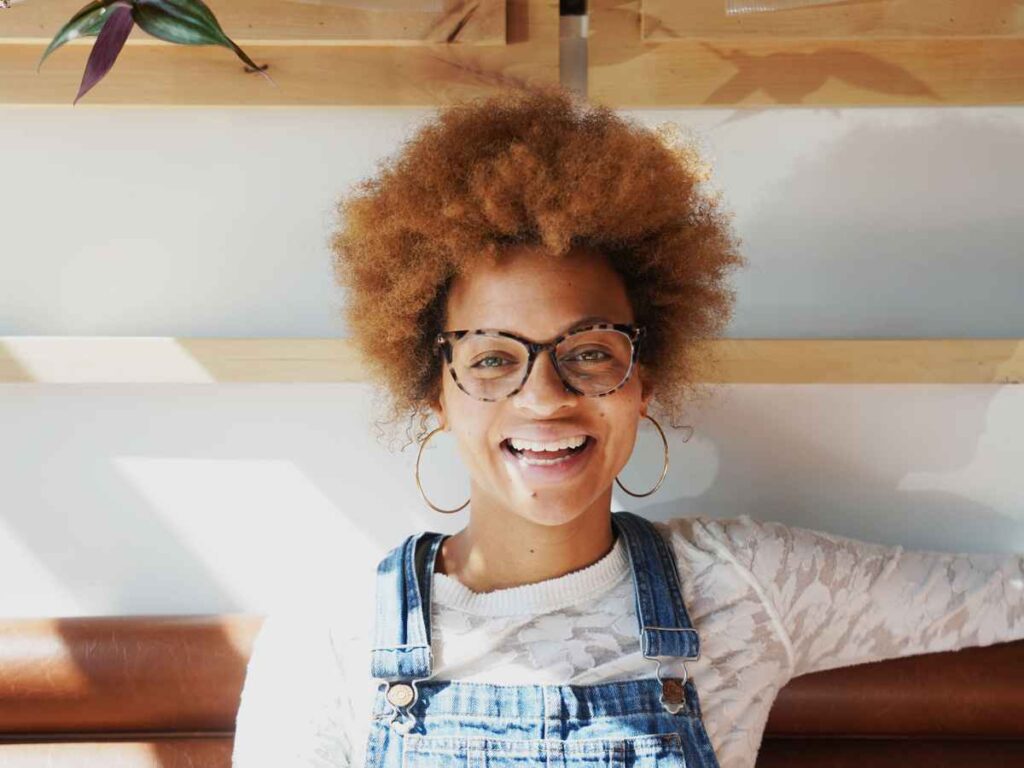
I am writing this sitting on the sofa and it is a Sunday. It has been a reflective eleven months in our little restaurant. We are still closed on Sundays; we are still open 5 to 9 p.m. Monday through Saturday; and my salary is still intact. We have retained our entire staff through a shutdown in March [2020] to summer patio service to takeout and delivery only as of October 31. All of our staff is well paid and no one works more than four days a week. I work a 34-hour week in four days, always ensuring I have two days off in a row. My assistant general manager is working a similar schedule. He is a thoughtful and emotionally intelligent young man who has a heart of gold, and who can make a cocktail better than any barman I’ve ever met.
Our motto is that we are only as good as our last smooth shift, and that is a reflection of our restaurant. My boss, Tommy Lee, is known for his generosity and hands-on approach to restaurant ownership. He is the smartest man I have ever had the pleasure of working for. He has set a standard for work-life balance, ensuring that mental health is just as important as the bottom line.
IN SOME WEIRD, MIRROR-LIKE PROJECTION, THE WORKPLACE HAS PROTECTED US DURING THE STRANGEST TIME IN OUR HISTORY.
I got into this industry later than most of my peers. I spent eight years as a professional dancer and I lucked into a job at a high-end and well-regarded restaurant in Cherry Creek. I was 28 and still thinking I would return to dancing. I was disciplined, mature, and not your average restaurant worker. I watched alcohol, cigarettes, Adderall, and cocaine control my peers’ lives. I moved up the ranks quickly and eventually managed for the company. I attribute this to my discipline, my attention to detail, and my dedication to what I began to see as a career. But the longer I stay in the industry, the more I realize I am only partially correct. As a whole, the next generation doesn’t view this as a career to be taken seriously. And so many in leadership positions are not helping young people see past the after-work cocktail.
Fast forward to present day. We are thriving. We are proud of the work we do, even if it’s harder without the satisfaction of guests smiling over their bowls of ramen. But the staff fights every single day to be their best. We here at Uncle are different because we are a kind of gang. We hold each other accountable. We hold each other up. We have protected the sanctity of the work space. And in some weird, mirror-like projection, the workplace has protected us during the strangest time in our history.
Safe Haven
By Sean Kenyon, bartender and proprietor of Blue Collar Cocktails, Denver
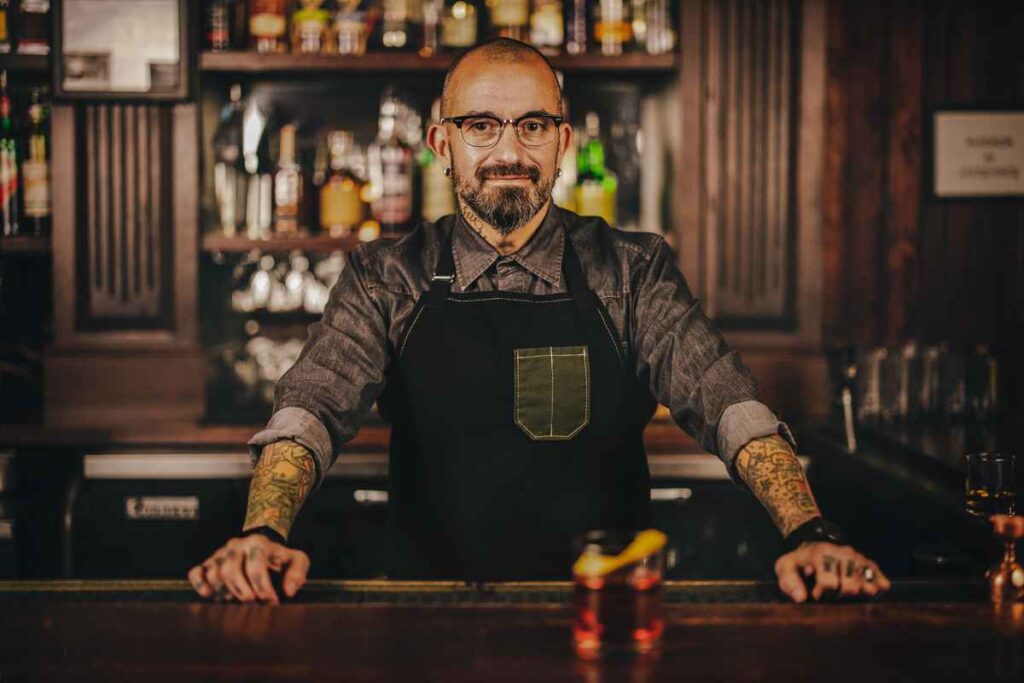
My love for bars started long before it was legal for me to drink. I grew up in them, and I am a third-generation bartender and bar owner. My mother, father, and grandfather were bartenders. I have worked in food and beverage since I was 12. I was an overweight kid who struggled socially and didn’t have many friends. My father’s bar was the one social setting where I found unconditional love and acceptance. Being there helped me gain confidence. It taught me how to converse, to interact, and to develop a sense of humor and a much-needed thicker skin. My father’s bar patrons became part of my family (my mother referred to them as my drunken uncles). My father, Bob Kenyon (known by seemingly everyone as BK), was a master of creating community. He treated his staff and guests like family and they, in turn, did the same. I have spent the entirety of my career either seeking similar work situations or trying to create them.
HOWEVER SIGNIFICANT [BARS AND RESTAURANTS] ARE FOR GUESTS, THEY ARE MONUMENTAL FOR THE PEOPLE WHO WORK IN THEM.
Now that I have my own bars, my goal is that everyone leaves in a better place than when they walked in. I feel an important responsibility towards our guests. The way I see it, my staff and I have the power to make or break someone’s day in a matter of seconds. If someone walks into our bar and we acknowledge them right away and bring them into our little community, then we’ve made them feel part of something greater. That is our goal. But if we ignore that same person when they walk in, we could ruin their day. It’s a big responsibility, but I love the challenge and it fulfills me when we get it right.
Bars and restaurants have long been the heart of our communities. They have been places to celebrate, commiserate, and hatch plans. You can walk in alone and instantly join a community, if only for the night. However significant these places are for guests, they are monumental for the people who work in them. They are sanctuaries for those who don’t fit in, a work version of the Island of Misfit Toys. They are places where someone—like me—who constantly feels like an outsider can experience inclusion and companionship.
Our industry has struggled, but we will endure. We are fighters and people who have overcome adversity. We will draw on that strength and fortitude. We will survive. Bars and restaurants are much more than food and drink; they feed and nurture the soul of society. And, like an old friend, they are there for you when you need them. Right now, those friends need your love.
Talk to us! Email your experiences (and thoughts, opinions, and questions—anything, really) to askus@diningout.com.

